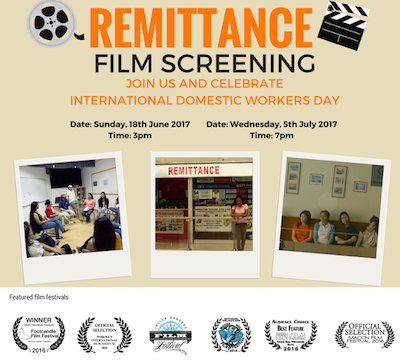-
Advocacy Theme
-
Tags
- Abortion
- Adoption
- Caregiving
- CEDAW
- Disability
- Domestic Violence
- Domestic Workers
- Harassment
- Healthcare
- Housing
- International/Regional Work
- Maintenance
- Media
- Migrant Spouses
- Migrant Workers
- Muslim Law
- National budget
- Parental Leave
- Parenthood
- Polygamy
- Population
- Race and religion
- Sexual Violence
- Sexuality Education
- Single Parents
- Social Support
- Sterilisation
- Women's Charter
Remittance: A realistic portrayal of lives of foreign domestic workers in Singapore
July 19th, 2017 | Employment and Labour Rights, News, Poverty and Inequality, Views

Remittance revolves around the life of Marie, a domestic worker from the Philippines who left her home in search of a better future in Singapore. It captures the story of how she copes with leaving her family behind while meeting the demands of her new employers. In the film, Marie struggles to balance her obligations and aspirations while also being supportive of her family back home. Murmurs were heard throughout the audience as familiar situations were portrayed on screen. A particular scene that resonated with the foreign domestic workers in the audience was when exorbitant agency fees kept Marie financially stranded for her first few months in Singapore and this inevitably affected her family back in the Philippines.
A short discussion was held after the screenings to draw out different perspectives and understand more about the issues surrounding migrant workers in Singapore. The panel for the second screening comprised Gwyneth Teo, co-producer of Remittance; Yolanda Bermas, supporting actress in Remittance; Jacqueline Loh, CEO of Aidha and Singapore Committee of UN Women Board Member; and Robina Navato, Sunday helpdesk volunteer at HOME. Jasmine Ng, AWARE board member and filmmaker/educator moderated the discussion.
A realistic portrayal of lives of foreign domestic workers in Singapore
“Remittance was supposed to be documentary, but became a narrative film when the directors realised that the lives of foreign domestic workers were much more compelling than statistics,” said Ms Gwyneth, who also highlighted how the team spent two years researching and conducting interviews with local champions of migrant workers’ rights HOME and TWC2. “Instead of telling one story, we wanted to tell a composite of stories”, she added. To retain the authenticity of the film, they hired mostly domestic workers and non-actors in Singapore.
It was this authenticity that touched the hearts of many. “I felt that the beginning of the film was my life story.” said Ms Robina, an audience member. “Your kids… you don’t know what happens to them when you’re away.” She also shared that there is a certain level of difficulty that comes with leaving children and family behind to work. “Most of the domestic workers are mothers and maybe half of them become single parents when they leave (their home country).”
Challenges faced at the structural level
A member of the audience voiced her concerns over the exorbitant agency fees and wondered if there is anything being done to tackle this issue. According to Ms Jacqueline Loh, there is already a cap on agency fees in the Philippines and Indonesia. “But it is common that (domestic workers) get $10 or $20 each month until (the fees) are paid off,” she says. Under the Employment Agency Act in Singapore, agency fees for domestic workers are capped at two months for a 2-year contract and one month for a 1-year contract. However, the problem lies in a loophole that allows agencies to deduct agency fees under a different guise such as recovering loans. There is thus a pressing need for policies to be changed in order to address this issue and effectively protect migrant workers.
Paving the road ahead
The session ended with a discussion on what the general public can do in order to help. Ms Jacqueline stressed the importance of raising awareness on the need for domestic workers to be educated, especially on financial literacy. Courses available at Aidha and HOME aim to empower foreign domestic workers so that they are better able to take charge of their lives.
The panelists also urged individual Singaporeans to engage themselves and not simply rely on organisations to tackle such issues. Employers, for example, should aspire to implement a cap on working hours, provide extra pay on public holidays, and grant annual leaves. Individuals looking to lend a helping hand can also raise awareness about the issue among family and friends, volunteer at local organisations like Aidha, HOME or TWC2 as mentors, or even campaign for the tightening of labour policies.
The lives of foreign domestic workers in Singapore are far more complex than what we often make it out to be. Coupled with poor working conditions and sometimes ineffective policies, foreign domestic workers’ livelihoods continue to plagued by hardships. It is imperative that everyone, from state agencies to civil society organisations to individuals, work together to make Singapore a better place for domestic workers to work and live in.



